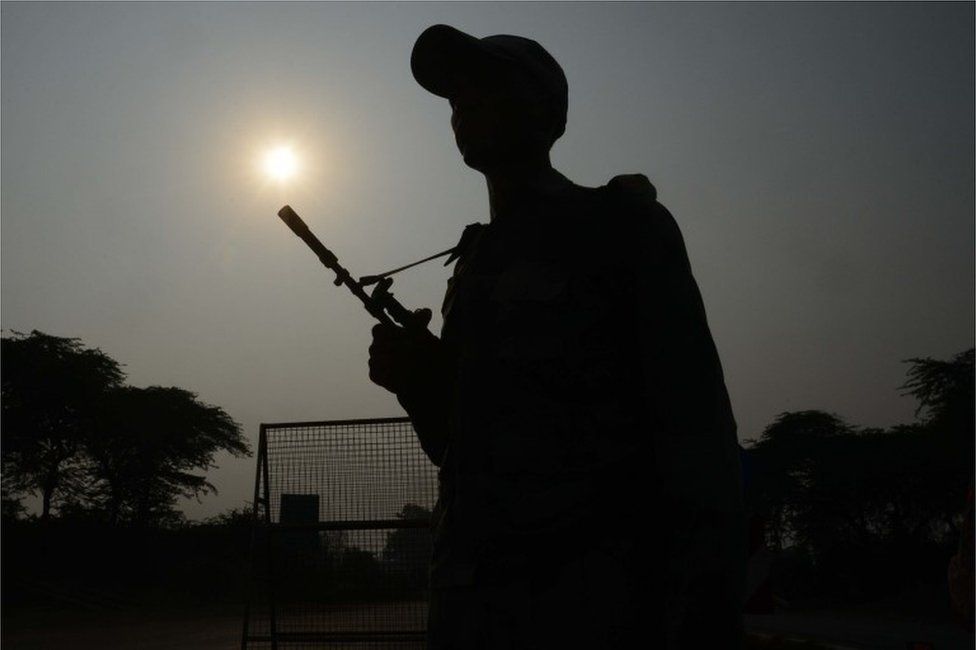Viewpoint: Border 'strikes' will not trigger an India-Pakistan war
- Published

For slightly less than two decades Indian policymakers have refrained from militarily responding to what it has called Pakistan-based militant attacks on Indian soil.
However, even though each attack was met with domestic outrage, in the end India's leadership, regardless of political ideology, eschewed any military response.
At best, according to knowledgeable journalists, they permitted some cross border artillery barrages.
The standard justification for inaction was the apparent risk of escalation, culminating in a nuclear exchange.
In effect, Pakistan's possession of nuclear weapons and its stated first-use doctrine had effectively neutralised any public retaliatory action by India.
'Strategic restraint'
Some political commentators in India sought to put a suitable gloss on this policy of inaction by referring to it as "strategic restraint".
This week however, the Narendra Modi government departed from past precedent.
Shortly after the attack on the Indian military base at Uri on 18 September, which had resulted in the deaths of 19 soldiers, an army spokesman had said that the country would respond "at a time and place of our own choosing". At a political level, Prime Minister Modi stated that the attack "would not go unpunished".
After some deliberation, on the night of 29 September, Indian special forces apparently struck across the Line of Control. The army said the strikes were directed against terrorist launch pads and appeared to have inflicted some casualties.
It is worth noting that India's Director-General of Military Operations, Lieutenant-General Ranbir Singh, had called up his Pakistani counterpart to alert him of the strikes.
This was an extremely prudent and deft gesture as it clearly conveyed to the Pakistani military that India was carrying out a very limited set of incursions.
'Red lines'
This operation has contradicted the popular belief that Pakistan's stated "red lines" meant that India could not engage in punitive strikes because of the inherent risks of nuclear escalation.
This belief persisted even though India managed to very successfully carry out the entire Kargil operation in 1999 under this nuclear shadow.
Once again, it needs to be recalled that the Kargil conflict was conducted with suitable Indian restraint. For example, Indian air force pilots had been under strict instructions not to breach the Line of Control for fear of provoking Pakistani concerns about a wider war.
It is entirely possible that in the days and weeks ahead, Pakistan will feel compelled to retaliate against this publicly acknowledged Indian action.
Many people have left their homes in villages close to the border with Pakistan in India's Punjab, fearing an escalation of hostilities.
It should also be noted that in a phone conversation with the US National Security Adviser, Susan Rice, India's National Security Adviser, Ajit Doval, made it clear that no further actions were contemplated. This meant that there was little to no possibility of an escalatory spiral.
In turn, her office issued a clear statement calling on Pakistan to rein in two UN-designated terrorist organisations based in the country, the Jaish-e-Mohammed and the Lashkar-e-Taiba.
Flawed argument
Even as further details about this military operation are awaited it is evident that India has now crossed a threshold in dealing with what it says are Pakistan's persistent provocations.
It has also shown that despite the ongoing turmoil in the Kashmir Valley, the regime in Delhi is still willing to carry out a strike into Pakistan-controlled Kashmir.
Some commentators within India have suggested that this incident will only fuel further jingoistic sentiment in the country and could thereby easily plunge it into an inadvertent conflict.
Such an argument, while superficially attractive, is actually quite flawed.
The action that was taken was limited in scope, firepower and duration. Its purpose was strictly punitive and demonstrative.
Having orchestrated this operation with some finesse and with little fanfare the government should now seize the opportunity in the restive Kashmir valley.
Instead of seeing the disturbances in the state as a purely law and order problem it needs to tackle the persistent political grievances that have wracked the state for some time.
Such a strategy will undercut attempts to stoke discontent in the Valley and blunt any efforts to revive the last embers of the insurgency in the state.
Sumit Ganguly is a professor of Political science, holds the Rabindranath Tagore Chair in Indian Cultures and Civilizations and is a Senior Fellow at the Foreign Policy research Institute in Philadelphia
- Published19 September 2016
- Published20 September 2016
- Published28 September 2016
- Published19 December 2023